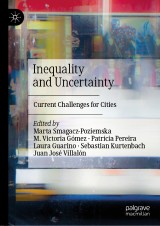Details

Inequality and Uncertainty
Current Challenges for Cities|
96,29 € |
|
| Verlag: | Palgrave Macmillan |
| Format: | |
| Veröffentl.: | 13.11.2019 |
| ISBN/EAN: | 9789813291621 |
| Sprache: | englisch |
Dieses eBook enthält ein Wasserzeichen.
Beschreibungen
<div>It is not possible to ignore the fact that cities are not only moving, vibrant and flourishing spaces, promising hope for better quality of life, but that they also accumulate and reflect significant problems. This book explores the relational and dynamic nature of urban inequalities, including their visible and invisible forms. By using the rather elusive term of ‘uncertainty’, the authors zoom in on specific aspects of urban inequalities that are difficult to measure, yet are acutely sensed and experienced by people and, more and more often, perceived as unfair. Here, in the recognition of inequalities as unjust and in the disagreement with the status quo, lies a positive aspect of uncertainty, which can lead to a social awakening and more active citizenship.<br></div>
<div>Chapter 1 Cities as the strategic terrain of research on contemporary inequalities and uncertainty.- Part I Urban inequalities and uncertainty as conceptual challenges.- Chapter 2 Social and Spatial Uncertainty and Inequality – The Refiguration of Spaces as Today’s Challenge for Cities.- Chapter 3 Cosmopolitanism vs identity and local belonging?.- Chapter 4 The Digital Natives and the Future City: Contradictions and Ambivalences.- Part II Revisiting social change and gentrification.- Chapter 5 Fear, Disgust and Dignity: The securitisation of everyday life and the new revanchism against the urban subaltern in a working-class area of Madrid.- Chapter 6 Protest and taste: socio-spatial restructuring of Moda.- Chapter 7 Urban inequalities and egalitarian scenes: relationality in urban placemaking and identity-building and paradox of egalitarianism.- Chapter 8 Outcomes of Urban Requalification under Neoliberalism: A critical appraisal of the SRU model.- Part III Urban diversity and boundaries.- Chapter 9 Feeling safe, defining crime and urban youth in Berlin’s inner city: An exploration of the construction of ‘unsafety’ and ‘youth’ as symbolic violence.- Chapter 10 Trust thy neighbour? Interpersonal trust in twelve ethnically diverse European neighbourhoods.- Chapter 11 Refugees and Borders: Simmel’s contributions on space and strangeness to reflect on the condition of contemporary refugees in Europe.- Chapter 12 The use of factor analysis in urban research: the case of the metropolitan area of Bilbao.- Part IV Answers for urban inequalities.- Chapter 13 From “chabolas” to invisible squats: a reflection on the residential informality evolution in Madrid.- Chapter 14 Urban scenes, cultural context exposure and contemporary health lifestyles: A multilevel analysis of Spanish sub-municipal areas.- Part V Environmental turn in urban politics.- Chapter 15 Urban Climate Governance in the Amazon.- Chapter 16 Greening the urban politics: the conflicts over tree felling in Warsaw.<br></div><div><br></div><div>Part 5: Environmental turn in urban politics </div><div>13. Fronika de Wit, Urban Climate Governance in the Amazon</div><div>14. Renata Putkowska-Smoter, Greening the urban politics: the conflicts over tree felling in Warsaw</div><div><br></div>
<div><div>Marta Smagacz-Poziemska is professor at the Institute of Sociology of the Jagiellonian University, Krakow, Poland.</div><div><br></div><div>M. Victoria Gómez is senior lecturer at University Carlos III, Madrid, Spain.</div><div><br></div><div>Patricia Pereira is a researcher in urban sociology at the NOVA School of Social Sciences and Humanities, Interdisciplinary Center of Social Sciences, Portugal.</div><div><br></div><div>Laura Guarino is a PhD candidate in Social Sciences at the University of Genoa, Italy and research assistant at the University of Aix-Marseille, France.</div><div><br></div><div>Sebastian Kurtenbach is interim professor for social policy at the University of Applied Sciences Münster, Germany.</div><div><br></div><div>Juan José Villalón Ogáyar is senior lecturer at the University National of Distance Education in Madrid, Spain.</div></div>
It is not possible to ignore the fact that cities are not only moving, vibrant and flourishing spaces, promising hope for better quality of life, but that they also accumulate and reflect significant problems. This book explores the relational and dynamic nature of urban inequalities, including their visible and invisible forms. By using the rather elusive term of ‘uncertainty’, the authors zoom in on specific aspects of urban inequalities that are difficult to measure, yet are acutely sensed and experienced by people and, more and more often, perceived as unfair. Here, in the recognition of inequalities as unjust and in the disagreement with the status quo, lies a positive aspect of uncertainty, which can lead to a social awakening and more active citizenship.
<p>Presents cutting-edge theoretical reflection and empirical evidence of the multifaceted challenges facing cities today.</p><p>Using both macro and micro approaches, presents and discusses multiple aspects of the daily life of our cities under the common rubric of uncertainty and inequality.</p><p>Provides evidence-based knowledge from diverse contemporary European case studies, pointing to interdependencies between economic, political, demographic and cultural factors of urban inequalities and uncertainty.</p><p>Edited by expert team of researchers from the European Sociological Association (ESA) Research Network 37:Urban Sociology.</p>
Diese Produkte könnten Sie auch interessieren:

Der Aufstand der Jugendlichen in den Banlieues: Eine Analyse der Pariser Unruhen von 2005

von: Ahmed El- Mamouni

23,00 €















